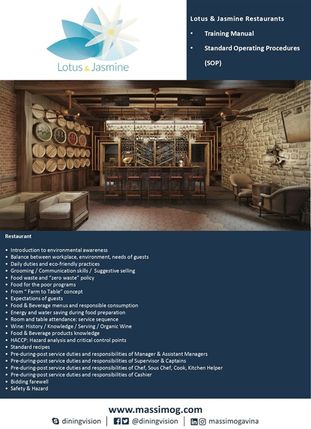Jun. 1, 2020
Steps to become a more environmentally friendly restaurant
As issues like climate change and plastic pollution are in the spotlight, diners are paying lots of attention to environmentally-friendly practices, food waste reduction, sustainability.
Quality of food and atmosphere, service, value for the money
are still important parameters when choosing a restaurant, but now people are also considering Corporate Social Responsibility as a factor which helps in taking the right decision.
Implementing environmentally friendly practices into a restaurant business
or starting a transformation will generate a positive effect, as customers will notice these initiatives, and they’re likely to become more loyal as a result.
There are many changes to consider, with some ideas difficult to execute because requiring
some time and others easy to integrate in daily operations in order to reduce the environmental footprint and support sustainability practices
Reduce Water Consumption
Low-flow faucets or taps operating from a motion
sensor can save thousands of liters of water; water-efficient toilets and kitchen equipped with energy star-certified dishwashing machines, ice makers and steamers will help as well for sure
No Paper
Big blackboards,
digital menus, more moments of interactions with guests are already replacing in part old style printed menus. Once a menu is in the restaurant's website, diners can be encouraged with proper signs to read it on their smartphones. A digital loyalty program
with rewards points can easily replace plastic or paper cards in a program that in addition shows a digital receipt, easy to be accessed in the loyalty app
Support Local Farmers & Family Businesses
If a restaurant
purchases locally, it gives a valuable contribution to reduce transportation impact and lower carbon emissions, compared to shipping or flying imported products. Another benefit comes from supporting small businesses that offer most probably fresh and organic
produce, free of preservatives and other chemicals
No Waste
Food waste coming from the kitchen and from customers can be donated to local farmers for compost. Food left at the end of the day and not suitable for serving
next day can be donated to charity organizations. Coffee grounds make great fertilizer, so eventually it can also be donated to guests to fertilize their gardens or to local farmers to fertilize their crops. Separate bins for food waste, glass, plastic, cardboard,
and general rubbish should be in place
Use Less Energy
One of the easiest steps to take is replacing non-energy saving lightbulbs and monitoring on unnecessary overuse of air conditioning. Depending on the climate, a “1-hour
on, 1-hour off” policy would literally cut in half the energy usage. Energy Star-rated microwaves, ovens, exhaust fans and all the appliances should be given priority when purchasing equipment
No Chemical-based Cleaning Products
When considering ways for eco-friendly solutions, we sometimes overlook an important area, which is cleaning. It is important to switch to environmentally friendly detergents and cleaning products free of chemicals. Eco-friendly hand soap for the
restrooms can be purchased in bulk and should fill existing dispensers
Recycle Old Furniture and Décor
If considering to open a new restaurant, we should choose sustainable products as more as possible, including
loose furniture. Reclaimed wood provides a trendy vibe as well as bamboo-based furniture. Table cloths and even cloth napkins can be washed and reused, just like real mugs, glasses and dishes to replace paper tissues and paper cups
Reduce
as more as possible a negative impact on the environment
a) Strict “no car” delivery policy; only pedestrian or bicycle deliveries for nearby delivery
b) Encourage staff to come to work riding a bicycle and offer
incentives to follow this program
c) offer a bonus to employees who share a car to work
d) No plastic straws!. Bamboo, metal or paper straws are recommended
Get Your Staff On Board!
To create the
right culture at work, during operations someone needs to be in charge of sustainable practices; a proper Tailor Made Training should be created; these initiatives needs to be
put in place only if and when the whole team share all values and everyone is on is on the same page, sharing also the common goal
Get Your Customers On Board!
Proper signs should make clear that the restaurant is
embracing sustainable practices and customers should get involved as well through activities like donating 10% of sales to a good cause, or hosting events that ultimately increase awareness locking them into a commitment. Social media accounts to promote dedication
to being an eco-friendly business should involve customers for ideas or feedback on how to bring in more sustainable techniques and methods
Share this page
